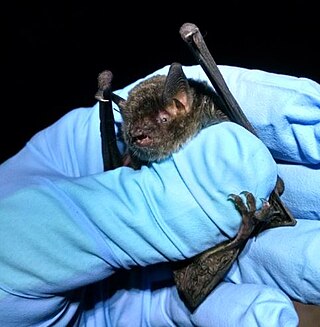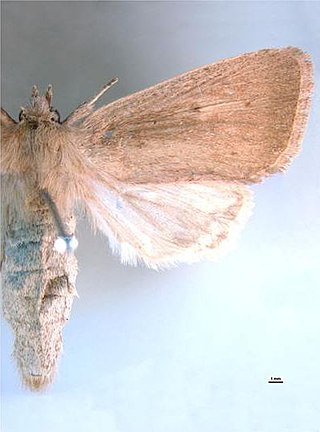
The gray bat is a species of microbat endemic to North America. It once flourished in caves all over the southeastern United States, but due to human disturbance, gray bat populations declined severely during the early and mid portion of the 20th century. 95% of gray bats now hibernate in only 15 caves. M. grisescens has been listed as federally endangered by the U.S. Fish and Wildlife Service since 1976, and is protected under the Endangered Species Act. Gray bat populations were estimated at approximately 2 million bats around the time they were placed on the Endangered Species list. By the early 1980s populations of gray bats dropped to 1.6 million. With conservation efforts in place, in 2004, gray bat populations were estimated to have reached 3.4 million.

A near-threatened species is a species which has been categorized as "Near Threatened" (NT) by the International Union for Conservation of Nature (IUCN) as that may be vulnerable to endangerment in the near future, but it does not currently qualify for the threatened status.

Callionima is a genus of moths in the family Sphingidae first described by Hippolyte Lucas in 1857.

The plain-mantled tit-spinetail is a small passerine bird of South America in the Furnariinae subfamily of the ovenbird family Furnariidae. It is found in Argentina, Bolivia, Chile, and Peru.

The southern shrikebill, or brown flycatcher, is a songbird species in the family Monarchidae. It is found in New Caledonia and Vanuatu. Its natural habitat is subtropical or tropical moist lowland forests.

Originally known as the Oklahoma Bat Caves National Wildlife Refuge, Ozark Plateau National Wildlife Refuge was established for the protection of endangered bats and their habitat. The refuge is made up of several parcels of land located in northeastern Oklahoma. These parcels contain numerous caves considered crucial for the bats' survival.

Byturidae, also known as fruitworms, are small family of cleroid beetles with over 15 described species, primarily distributed in the Holarctic and Southeast Asia. The larvae of at least some genera feed on fruit, such as Byturus, a notable commercial pest of Rubus consuming both the fruit and seeds, while others like Xerasia are associated with catkins. The adults are known to feed on developing leaves, flowers and pollen.

Epipsilia grisescens is a moth of the family Noctuidae. It is found in Fennoscandia, Denmark as well as the Pyrenees, Alps, Apennines, Balkans and Carpathians. In the Alps it is found up to 2,000 meters.

Callionima grisescens is a species of moth in the family Sphingidae. It was originally described by Rothschild as Calliomma grisescens, in 1894.

Sesamia grisescens, the pink sugarcane borer, pink stalk borer, shoot borer, sugarcane borer or ramu shoot borer, is a moth of the family Noctuidae. The species was first described by Warren in 1911. It is found in Papua New Guinea, Seram, the Moluccas and New Britain.
Scopula grisescens is a moth of the family Geometridae. It is found in Uzbekistan.
Apisa grisescens is a moth of the family Erebidae. It was described by Abel Dufrane in 1945. It is found in the Democratic Republic of the Congo, Malawi, Mozambique and Zimbabwe.
Episcepsis grisescens is a moth of the family Erebidae. It was described by George Hampson in 1914. It is found in Venezuela.

Parastesilea is a genus of longhorn beetles of the subfamily Lamiinae, containing the following species:
Cylindilla grisescens is a species of beetle in the family Cerambycidae. It was described by Henry Walter Bates in 1884. It is known from Japan.
Parastesilea alboscutellaris is a species of beetle in the family Cerambycidae. It was described by Stephan von Breuning in 1968.
Parastesilea latefasciata is a species of beetle in the family Cerambycidae. It was described by Stephan von Breuning in 1938, originally under the genus Stesilea.

Parastesilea scutellaris is a species of beetle in the family Cerambycidae. It was described by Francis Polkinghorne Pascoe in 1865, originally under the genus Stesilea. It is known from Sulawesi.
Xerasia grisescens is a species of fruitworm beetle in the family Byturidae. It is found in North America.

Dasyuris anceps is a species of moth in the family Geometridae. It is endemic to New Zealand.











